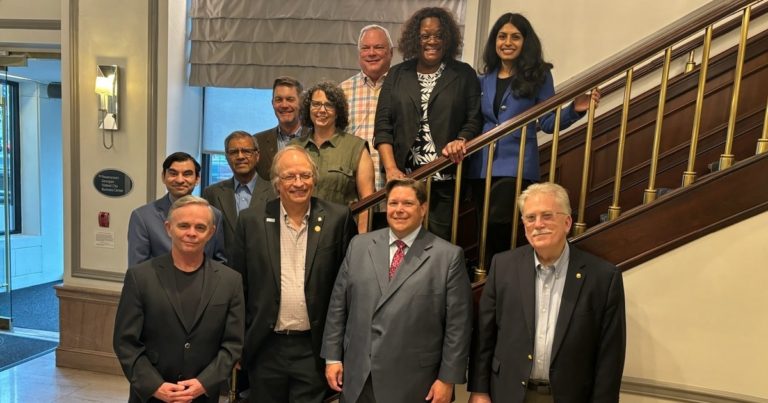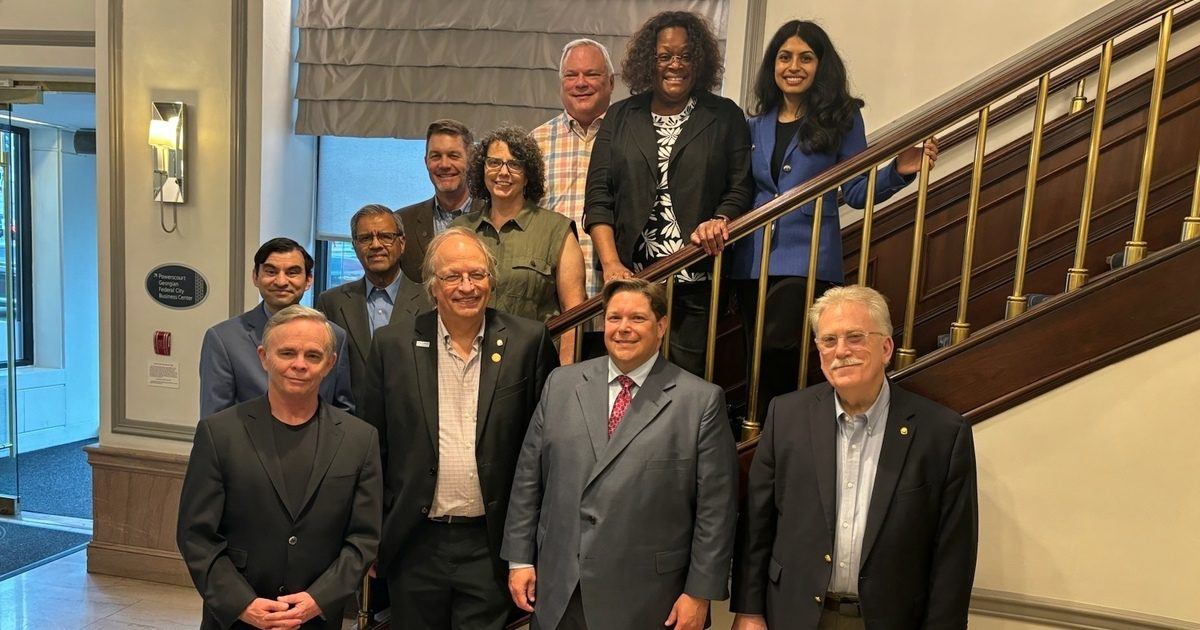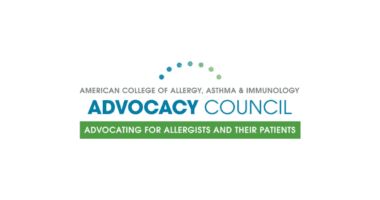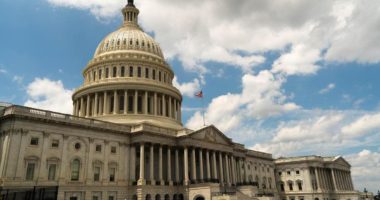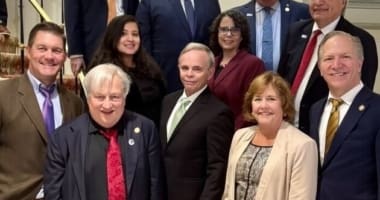On May 7, eight leaders from the College and the College’s Advocacy Council participated in the 2024 ACAAI Strike Force visit to Capitol Hill to advocate in support of legislative issues that will help practicing allergists and our patients.
This year’s delegation included ACAAI President Dr. Gailen Marshall, ACAAI President-elect Dr. Jim Tracy, ACAAI Vice President Dr. Cherie Zachary, ACAAI Executive Medical Director Dr. Todd Mahr, ACAAI Director of Advocacy Dr. Allen Meadows, Advocacy Council Chair Dr. Travis Miller, Advocacy Council Vice Chair Dr. Wes Sublett and Advocacy Council Member Dr. Razi Rafeeq. The group was supported by its legislative government relations consultants Matt Reiter and Luke Schwartz.
The Strike Force members also participated in the Allergy and Asthma Network’s (AAN’s) advocacy day on May 8. This partnership is an important opportunity to show a united front between patients and their physicians on important issues such as epinephrine access and lowering prescription drug cost-sharing. Joining the Strike Force participants for the AAN meetings were Dr. Melinda Rathkopf, Dr. Vivek Rao and Dr. Leena Padhye.
View the 2024 Strike Force Photo Gallery
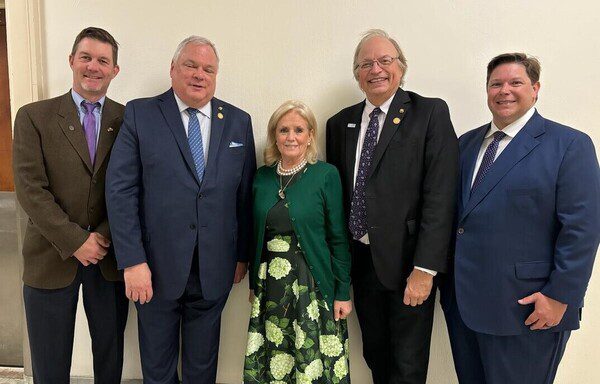
Building and strengthening relationships
The Strike Force featured 22 meetings with staff for senators, representatives and committees with jurisdiction over health policy. Three other meetings will be rescheduled as virtual meetings in the near future due to some last-minute scheduling changes, bringing this year’s total number of Strike Force meetings to 25.
ACAAI had 11 allergists participate in the AAN advocacy program the day after the Strike Force. AAN’s advocacy day brings allergy and asthma patients to Washington for a day of meetings with policymakers and advocacy training sessions. The AAN advocacy day featured an impressive 140 meetings with legislators from 28 states. Participating in these meetings are an important way for us to expand our advocacy footprint while also aligning with our patients.
The Strike Force coincided with the Congressional World Asthma Day Briefing, an event the College co-sponsored, which featured remarks from Rep. David Valadao (R-CA-22) who co-chairs the Congressional Allergy and Asthma Caucus.
This year, the Strike Force selected strategic advocacy topics that will strengthen and expand our relationships with legislators who champion issues important to practicing allergists such as reimbursement from government and commercial payers and issues that directly impact allergy and asthma patients such as medication access and research funding.
One highlight of our visit was a meeting with Representative Greg Murphy of North Carolina. Representative Murphy is a co-chair of the Republican Doctors “Doc” Caucus and is the lead sponsor on many bills that will increase reimbursement to physicians from government and commercial health insurers. The College also met with staff for other physician senators and representatives who are especially sensitive to the financial and administrative burdens practicing allergists face every day.
We also met with legislators who have taken an interest in particular allergy and asthma issues such as food allergy research funding.
Our meetings also included the committees that have jurisdiction over these topics. Legislation must pass through a committee before being considered by the entire chamber. Therefore, committee staff are important gatekeepers for which bills are prioritized.
While most meetings were with policy staff who lead the relevant issue portfolios on behalf of these offices, our group had several opportunities to meet with the representatives themselves. These included:
- Greg Murphy, MD, co-chair of the Republican Doctors “Doc” Caucus who has taken a leading role on legislation to increase government and commercial insurance payment rates to physicians.
- Robert Aderholt, chair of the House Appropriations Subcommittee for Labor, Health and Human Services and Education. This subcommittee is responsible for funding the Department of Health and Human Services (HHS) and its sub-agencies such as the Centers for Medicare and Medicaid Services (CMS).
- Debbie Dingell and Rep. David Valadao, the two co-chairs of the Congressional Allergy and Asthma Caucus.
- Gary Palmer, member of the House Energy and Commerce Committee with jurisdiction over healthcare issues.
- Marcy Kaptur.
- Barry Moore.
- Don Bacon.
- Derrick Van Orden.
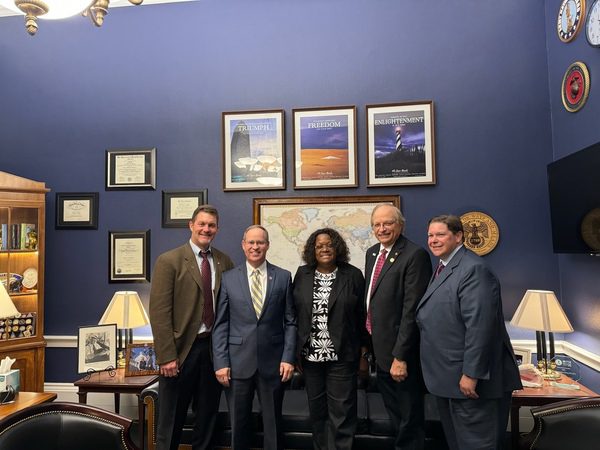
On the issues: fighting for allergist reimbursement and investments in asthma and allergy care
Fighting against short-term payment cuts and for sustainable Medicare reimbursement reform is the College’s top advocacy priority.
Inflation has outpaced annual updates to physician payments by over 20% since 2010. These financial pressures make it more difficult for practices to remain open and have forced many physicians to leave the clinical workforce. These pressures are further exacerbated by policies that would further reduce Medicare payments to physicians such as sequestration and the 4% PAYGO cut that Congress must address before the end of the year. Medicare payments have broader impacts because many commercial payers base their rates on the Medicare rate. Commercial payers are further squeezing medical practices with electronic payment fees from virtual credit cards and EFT transactions.
This year’s Strike Force provided us an opportunity to advocate for legislation we endorsed to increase payments to physicians including:
- R. 2474 the Strengthening Medicare for Patients and Providers Act, which would provide annual inflationary adjustments to Medicare payment rates to physicians.
- R. 6371 the Provider Reimbursement Stability Act of 2023, which would give CMS more flexibility to make changes to reimbursement rates within the Medicare Physician Fee Schedule (PFS) before the statutory budget neutrality requirement would apply.
- R.6487/S.3805, the No Fees for EFTs Act, which would close a regulatory loophole some health plans and third-party payment vendors exploit to charge physician practices a fee on electronic payments via the standard EFT transaction.
The Strike Force also allowed us to advocate in support of legislation that would help our patients. These bills include:
- R.6965, the EPIPEN Act, which requires commercial health plans to cover EpiPens and caps patient cost-sharing at $60 per two-pack.
- R. 3935, the FAA Reauthorization Act 2024, which includes a provision that would require the FAA to review and update airplane first aid kits based on their ability to address anaphylaxis with the goal of ultimately requiring the kits to include epinephrine auto-injectors.
- Various pharmacy benefit manager (PBM) reform bills that would help ensure patients have access to affordable medication.
- FY 2025 appropriations for food allergy research programs.
Of course, our group could not pass up the opportunity to discuss the Change Healthcare cyberattack. Offices we met with were very interested in hearing about how the disruptions are impacting allergy practices and our patients. Congress continues to consider how it can respond to the cyberattack with legislation. Many offices we met with asked for our suggestions on this topic. In most cases, we could have spent more than our scheduled 30 minutes talking about this issue alone. In those cases, we agreed to remain in touch and set up additional virtual meetings in the future to discuss our recommendations for how Congress can help address the impact the cyberattack is having on medical practices.
Some Congressional offices have recently taken an active approach to scrutinize inhaler manufacturers for high prices. While these efforts have not resulted in legislation, many manufacturers agreed to lower patient cost-sharing for some of their products. The College has been a resource to these offices regarding inhaler prices since the beginning of their effort. Throughout the year we have held several meetings with the offices leading this effort to share the physician’s perspective on inhaler access for patients. The Strike Force gave us an opportunity to educate other offices about this effort and to establish ourselves as a resource on inhaler price issues.
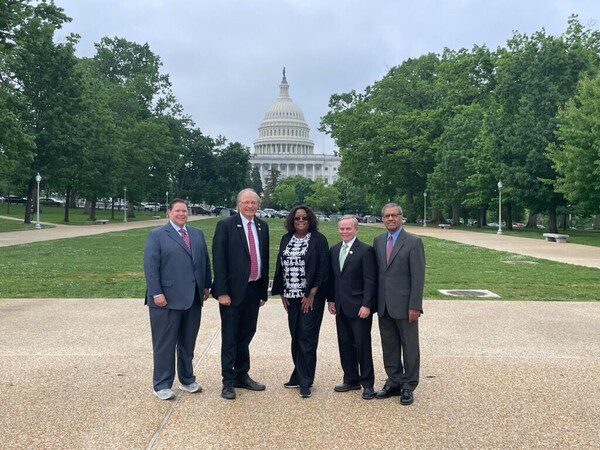
Conclusion
The Strike Force is an important opportunity for us to spend one day each year meeting in person with important legislative offices. These meetings help us advocate for our policy priorities and further establish the College and the Advocacy Council as a resource on these topics for these offices.
These meetings are an investment into relationships with legislators who can make a positive difference for us on important policies. For example, our relationships with key legislators were the key to our past success in preventing the USP from revising chapter 797 in a way that would have made it impossible for allergists to continue offering immunotherapy shots to our patients. That advocacy effort was supported by AAN thanks to our close partnership.
Our advocacy on behalf of allergists does not end after everyone flies home. We will continue to capitalize on follow-up opportunities from these meetings and to fight for these priorities throughout the year.
The Advocacy Council – ADVOCATING FOR ALLERGISTS AND THEIR PATIENTS.
